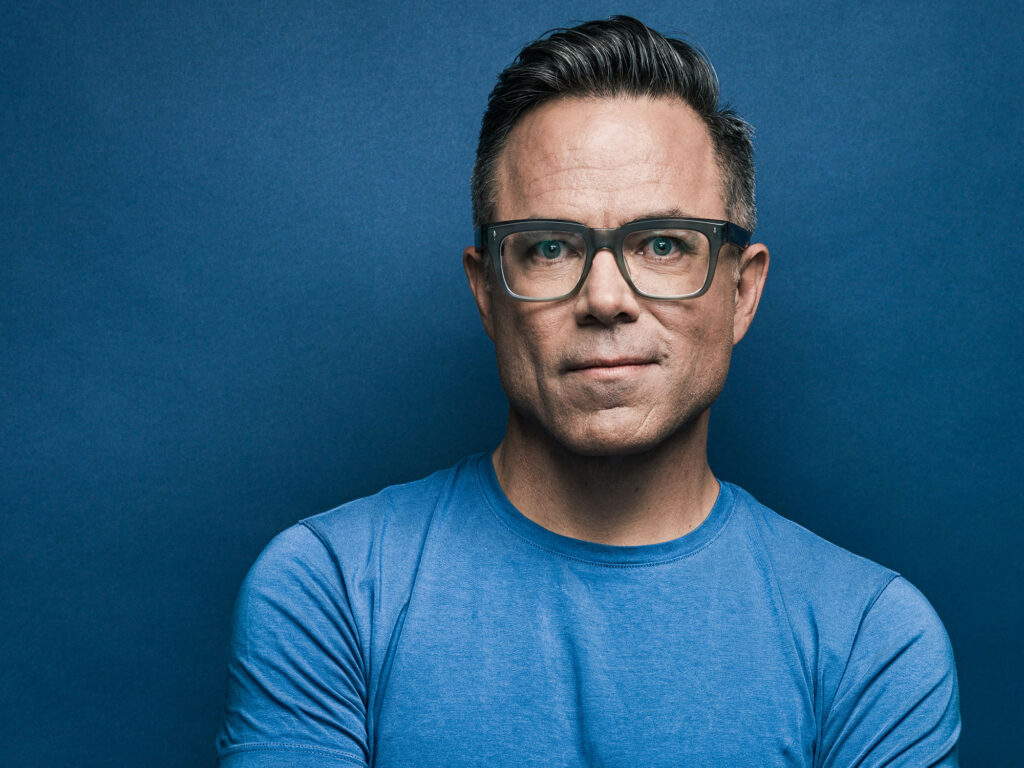Topics such as health and longevity are extremely popular on social media, as demonstrated by the success of the ‘Huberman Lab’ podcast. Timothy Caulfield, professor of health law and science policy, is critical of this trend. He highlights a lack of scientific evidence, the search for ‘magical solutions‘, and the communication that forms part of the ‘manosphere‘.
“Wellness becomes the entry point into the alt-right world”
Viktar Vasileuski: Andrew Huberman’s podcast is the most popular in the Health and Fitness category on Spotify. What do you think of him?
Timothy Caulfield: Huberman is a fascinating character. I think he is an individual with impressive academic and scientific credentials. He is an associate professor at Stanford where he runs a laboratory called the Huberman Lab. The degree to which it is a sophisticated lab is open to debate.

Mia Mertens: Why does he reach such a big audience?
Caulfield: Number one; wellness, health and this idea of longevity, have become increasingly popular topics. Number two; he has this scientific credibility that he brings to the table. Number three; let’s be honest, he is a good science communicator. When he talks about science, he uses a very appealing tone. He is engaging and people like it. Number four; I do think his audience wants to hear the message that he is selling. This is an audience that wants magical solutions. What they want lies beyond the science informed basics.
Mertens: The podcast has often been criticized for taking studies out of context.
Caulfield: Huberman deploys something that I call “Science-ploitation”. He uses a little bit of real science to justify what he’s talking about. Sometimes the science is just an animal study. Sometimes it is very preliminary or just a lab study. He also often ignores the body of evidence. One of the best examples of this is the flu vaccine, which he says he doesn’t take. He also uses very sciency language to give this veneer of scientific legitimacy. If you actually parse what he’s saying, all of it sounds credible. One of my favorite examples of that is his episode on cold plunges, where he says things like ‚there are scientific papers on this‘. Throughout the podcast, it sounds like he’s being relatively cautious about what the science actually says. But it’s clear, the takeaway from the episode is: We should all be doing this. You’ll live longer if you take cold plunges.
Mertens: Why does he do this? What is he trying to sell?
Caulfield: Much of the wellness industry is trying to sell not just a healthy lifestyle, but a longer life. It’s not just about living longer and being healthy; it’s about optimising your life – you are going to be a super CEO and you are going to be this really impressive individual, even though there’s no evidence on how to achieve that beyond living a healthy lifestyle.
So beyond not smoking, drinking in moderation, or not at all, exercising, eating a healthy diet, getting a good night’s sleep, doing the evidence informed preventative things like getting vaccinated and surrounding yourself with people you love, there is not much more. Everything else is, at best, nibbling at the margins, or is not science-based. And he’s very much trying to sell that there’s some other kind of special path that you can take that’s going to make you healthier and sort of superhuman. But there really is no robust evidence to support that.
Mertens: Do you think he could be equally successful if he communicated the limitations of scientific evidence?
Caulfield: That’s a less sexy, less powerful message, especially in our noisy information environment. Fear and grievance and definitive messaging often win out, right? We know that people often just look at the headline, they just look at the meme. They don’t click through. So absolutely, being respectful to scientific uncertainty can make science communication more difficult.
But just because it’s difficult doesn’t mean we shouldn’t do it. And I think there are good science communicators out there who are doing it. The good news is you’re seeing more and more clinicians who do a really good job. They appear on YouTube, on TikTok, on Instagram, and I love that. I think we have to get creative. We have to use humor and art, and all these different kinds of strategies to communicate.
Vasileuski: What exactly is Andrew Huberman promoting beyond science?
Caulfield: Huberman is “of the moment”. So, what do I mean by that? He is part of what’s been called the “manosphere”.
Vasileuski: What characterizes him as representative of that community?
Caulfield: Firstly, there’s his aesthetic. The black T-shirt, he’s jacked, the beard and the short haircut. He looks like he’s a boxer or an Ultimate Fighter. And so he very much plays to that manosphere audience similar to Joe Rogan and I don’t think it’s going too far to say he plays to the MAGA crowd in the United States.
Vasileuski: Is that enough to put him into that box?
Caulfield: If you say “manosphere podcaster” and you close your eyes and imagine someone, they look like Huberman, they look like Joe Rogan. He uses cues to connect with that audience: “Hey, I’m part of your community.” With our research team, we found out that a lot of the embracing of misinformation is about community. “This is my team, this is my community. I’m part of this group. This is my ideology.”
Vasileuski: So, you’re saying that we should not only focus on him and the messages that he promotes, but also on who’s actually receiving those messages?
Caulfield: I’m fascinated by the political identity aspect of the spread of misinformation, especially health misinformation. I’ve been studying this for decades and it felt like political identity was always lurking. It was always part of it. But now it seems core. If you think of the anti-vax community. If you think of carnivore diets. If you think of people like Jordan Peterson. Wellness becomes the entry point into the alt-right world, the MAGA world. And so that does worry me. Again, part of that is the community aspect. There are certain views that you have to adopt to demonstrate you’re part of this community. A wellness community feels like a more benign entry point to becoming part of this community than antisemitism or anti-immigration policy, right? Then all of a sudden you’re part of this.
Vasileuski: Do you think the US American healthcare system produces science influencers such as Andrew Huberman?
Caulfield: In the United States, you have a large proportion of the population who doesn’t have reasonable access to healthcare. I also think, and this is something I’ve argued for my whole career, it promotes this kind of high tech, highly interventionist approach to health. And it puts the responsibility on the individual. In the United States it’s your responsibility to be healthy. Public health is being portrayed like a socialist idea. It’s your responsibility to optimize your life and if you’re not doing it, you’re failing morally. If you’re not living a life like Huberman recommends, you’re inferior. All this wellness noise distracts the country from the things that you really need to do to make your country healthy: access to healthcare, you need education, you need equity, you need justice. These are the things that really make a difference.






